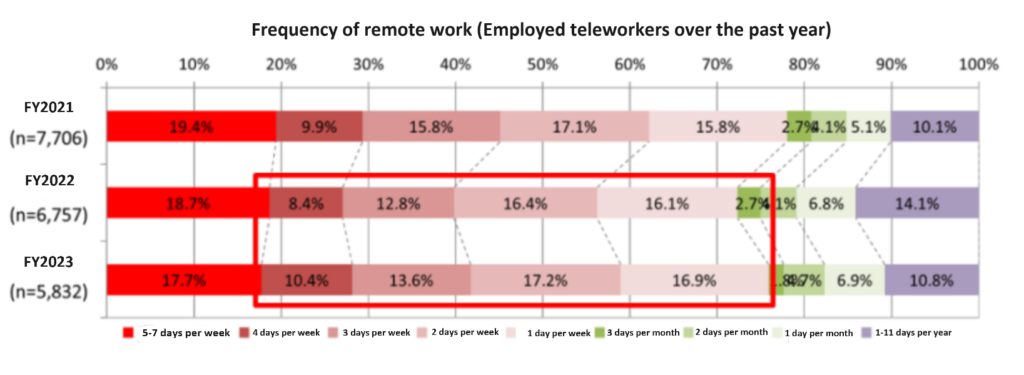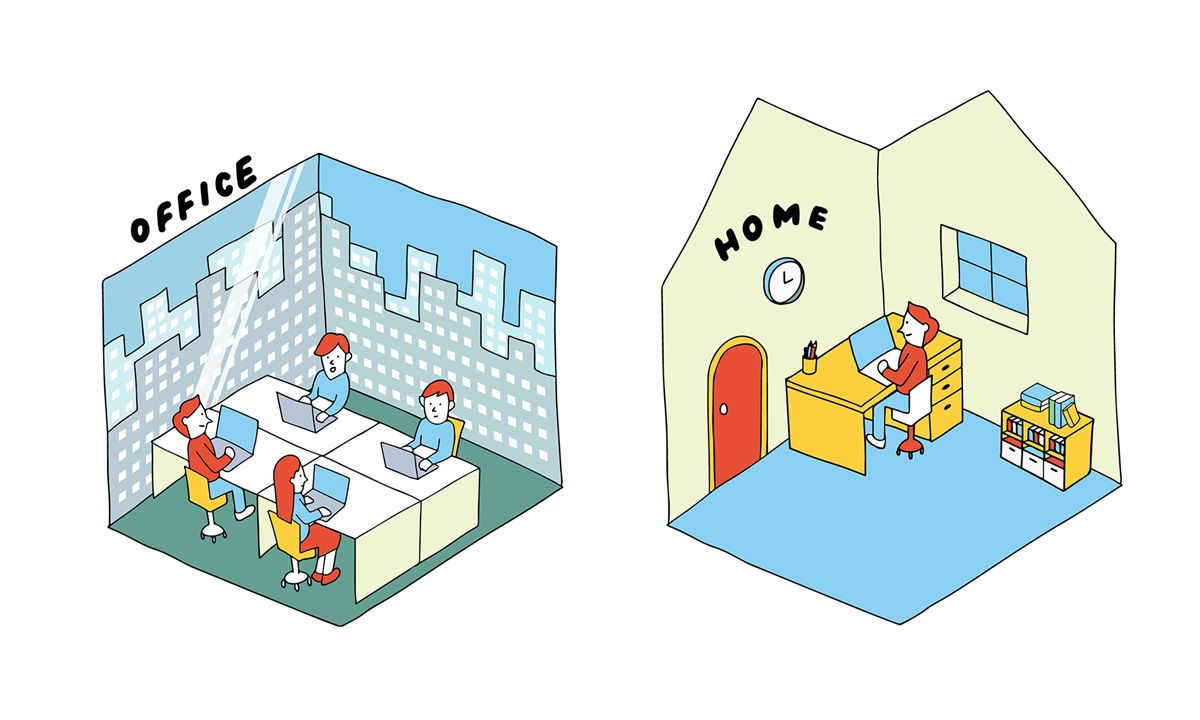May 8, 2024 marked one year since COVID-19 was downgraded to Category 5 in Japan. Immediately following this transition, a clear trend towards a “return to the office” emerged. Alongside that, companies were faced with a surge in resignations due to return to the office policies. Additionally, reports highlighted difficulties in managing childcare due to the need to commute. Even today, many companies are exploring how to balance office attendance and remote work to achieve more flexible work styles.
How has Japan’s work style evolved over the past year since the return to the office began? What is the current mainstream work style in countries like the US and the UK, where companies like Amazon and Tesla have made headlines for pushing employees back to the office? This article examines changes in work styles in various countries based on surveys and examples.
Table of Contents
The Establishment of Hybrid Work: Findings from Japan’s Ministry of Land, Infrastructure, Transport and Tourism
According to the Japanese Ministry of Land, Infrastructure, Transport and Tourism’s “2023 Telework Population Survey,” while some employees are being called back to the office due to the lack of remote work options from their employers, the implementation of remote work remains at a high level.
The survey found that the percentage of “employed teleworkers” who have engaged in remote work while being employed by companies or organizations is 24.8% nationwide (a decrease of 1.3 points). Although the number of remote workers is declining nationwide, it remains significantly higher compared to pre-pandemic levels. Particularly in the Tokyo metropolitan area, the percentage remains around 40%.
Regarding the frequency of remote work, the proportion of employed teleworkers who engaged in remote work “1-4 days a week” increased over the past year, indicating a growing trend towards hybrid work.

In the 2023 fiscal year, the percentage of people who engaged in remote work “1-4 days a month” increased compared to the 2022 fiscal year, further demonstrating the firm establishment of hybrid work.
Changes in Work Styles Around the World
The survey by Japan’s Ministry of Land, Infrastructure, Transport and Tourism reveals that hybrid work is becoming established in Japanese society. But how are work styles changing in other countries? This section highlights examples from the US, UK, and Singapore.
USA : Support for “5 Days a Week in Office” Drops to 34% Among CEOs

In the US, companies like Amazon and Tesla made headlines for demanding employees return to the office. However, a survey by KPMG US, one of the Big Four accounting firms, of 100 CEOs of major US companies, revealed that not many CEOs expect their employees to work full-time in the office.
In 2023, 62% of CEOs anticipated a return to a work style based on office attendance (5 days a week), but by 2024, this figure had dropped to 34%. Conversely, the proportion of CEOs predicting that hybrid work would become mainstream increased from 34% in 2023 to 46% in 2024, indicating a shift over the past year.
While Japanese media reported extensively on the “return to the office” trend in the US, it appears that hybrid work, combining remote work with office attendance, is likely to become the norm.
Reference:
More CEOs expect hybrid work is here to stay
KPMG Study: CEOs tackling risks to growth including geopolitics, cyber and structural changes such as tight labor market, new regulations
United Kingdom: London Underground Usage Remains Below Pre-Pandemic Levels

In London, remote work has become so entrenched that many people are not commuting to the office on Fridays.
According to the London Transport Authority (TfL) and BBC reports, midweek underground usage is at 85% of pre-pandemic levels, and Friday usage drops to about 73%.
In response, from March to May 2024, London has designated every Friday as an “off-peak” period with discounted fares to encourage travel by tourists rather than commuters.
This change indicates how urban infrastructure is adapting to the establishment of remote work.
Reference:
Off-peak Friday fares trial to start for Tube and trains in London
In the City – deals and things to do
Singapore: All Companies Can Request Flexible Work Arrangements

In Singapore, the government announced in April 2024 that from December 1 of the same year, employees would be able to request flexible work arrangements, such as remote work, reduced weekly working hours, and flextime, from their employers.
Under the new guidelines, employers are not legally obliged to accommodate these requests if they determine it would interfere with business operations. However, employees will have the right to make such requests regardless of the company’s size.
Similar initiatives have already been implemented in the UK, Ireland, and Australia, indicating a global trend towards flexible work arrangements.
According to a 2023 survey by research firm Universum, 73% of young employees in Singapore expressed a preference for remote work.
The Growing Preference for Flexible Work Styles
Following the downgrade of COVID-19 to Category 5, the trend of returning to the office was prominent in Japan. However, mandatory office attendance has led to burdens such as commuting time and reduced time for family life, including childcare and eldercare, resulting in decreased overall satisfaction and unwanted resignations for companies. As a result, the establishment of hybrid work, which combines remote work with office attendance, has become more pronounced.
Globally, there is a continued shift towards hybrid work styles rather than solely office-based work, with more countries and companies exploring flexible work arrangements.
In response to unavoidable structural changes in Japanese society, the Japanese government is promoting childcare support, and as part of this, the realization of flexible work styles will remain a medium- to long-term theme. Consequently, hybrid work utilizing remote work is expected to become even more widespread in the future.


